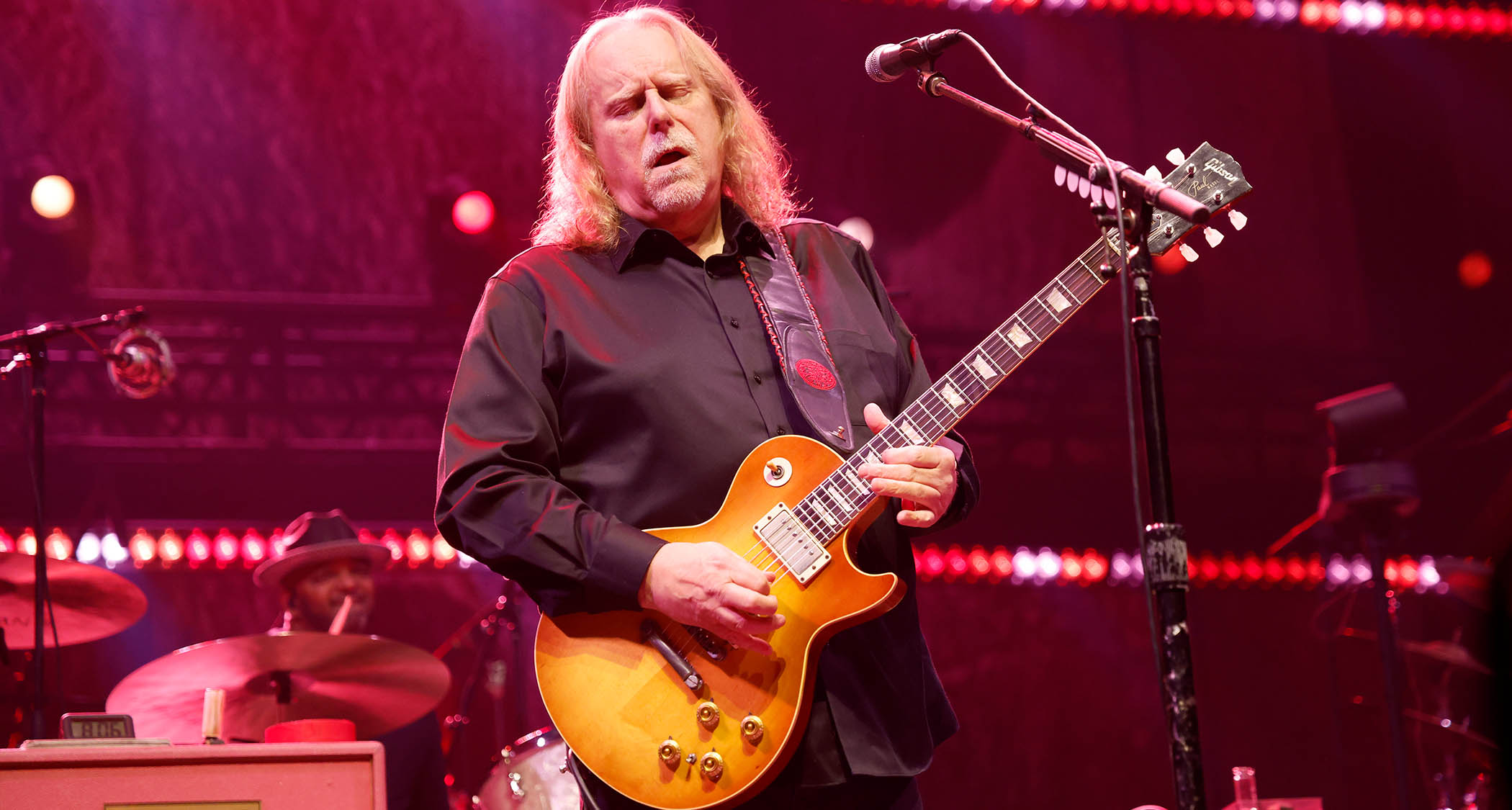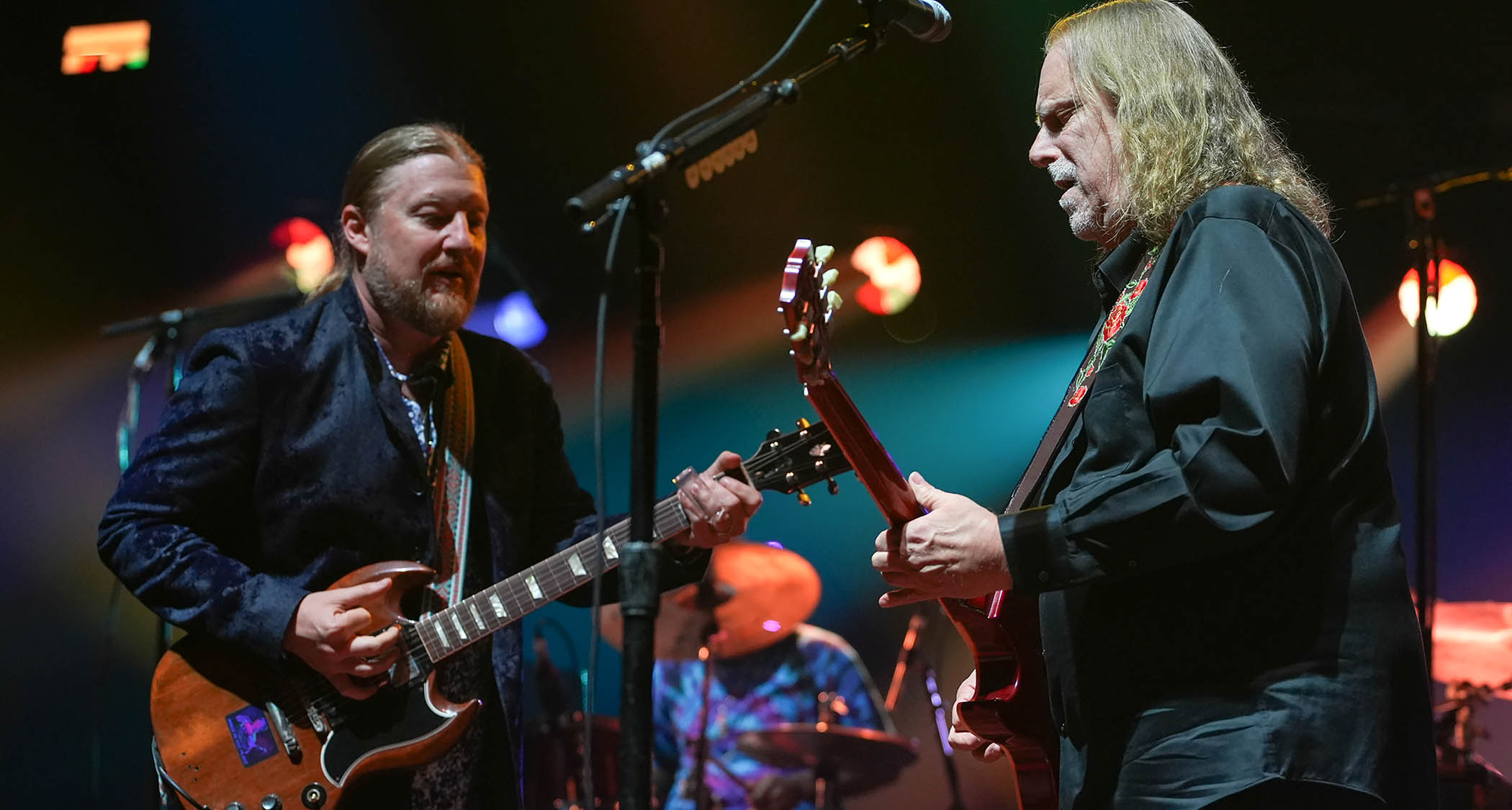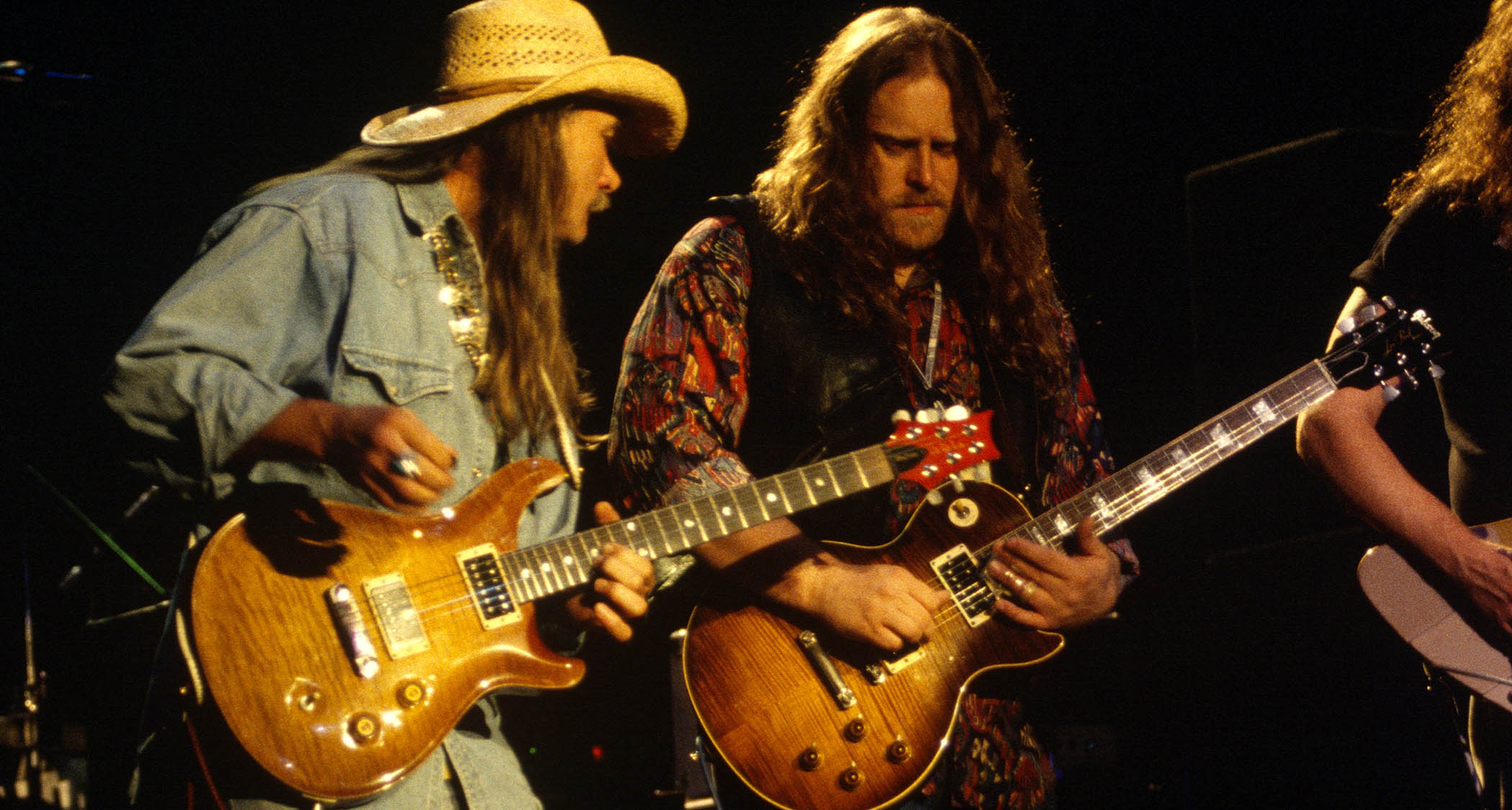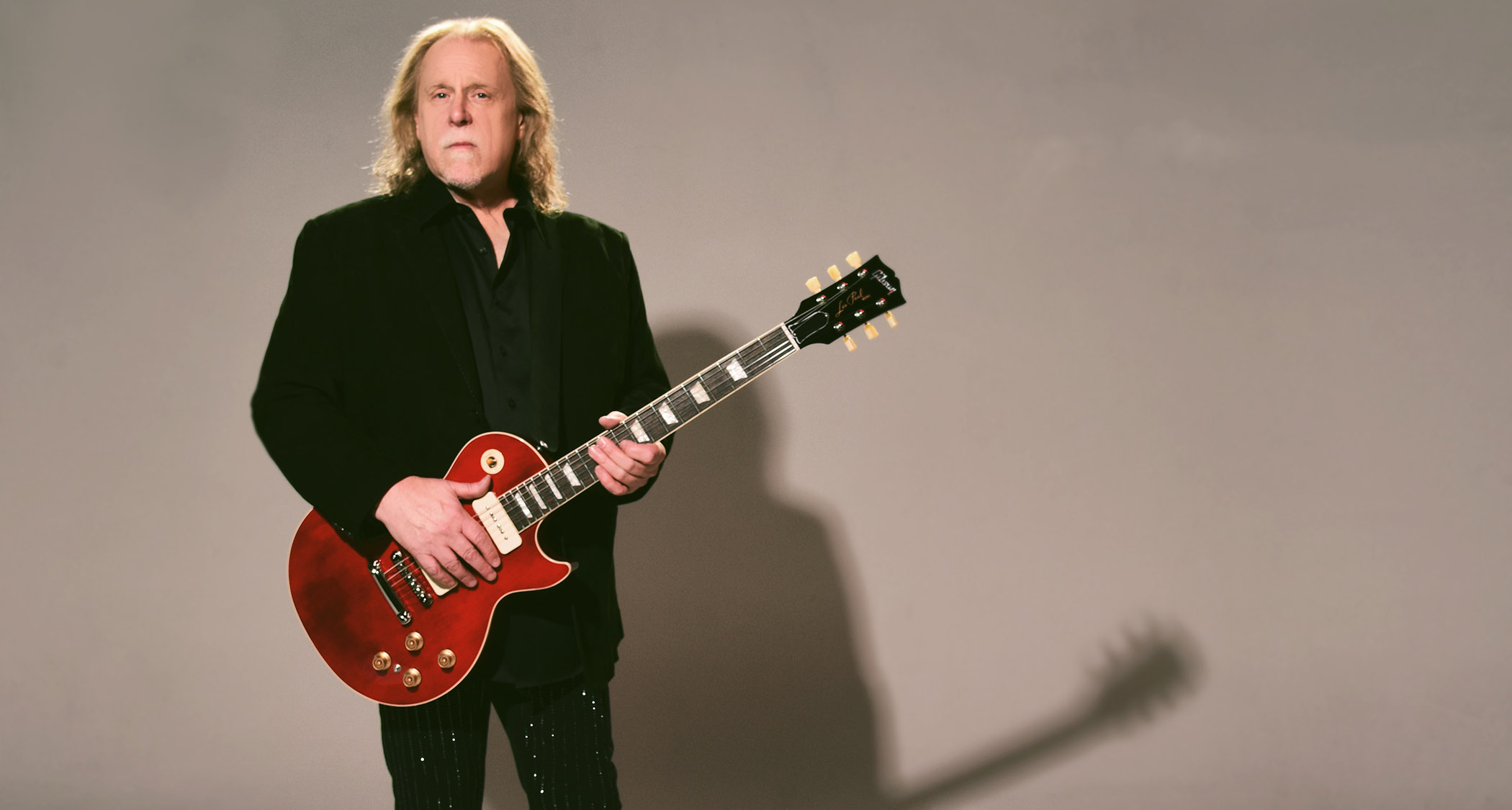“There were 300,000 people there, so just the adrenaline rush alone was making for some great music”: Warren Haynes on putting his stamp on Allman Brothers' classics, Woodstock ’94, and finishing what Gregg Allman started with Derek Trucks’ help
The Whisper Sessions finds the Gov't Mule frontman paring his solo album back to its essence, and here he talks about how it all ties in with seminal experiences with David Allan Coe and the Allmans

Want all the hottest music and gear news, reviews, deals, features and more, direct to your inbox? Sign up here.
You are now subscribed
Your newsletter sign-up was successful
Warren Haynes had no intention of releasing The Whisper Sessions as a standalone release, at least not at first.
Sitting in the inner sanctum at the Gibson Garage London, where they keep the good stuff (there’s a Korina Flying V on the couch beside us), he explains that the idea at first was to pare down some choice cuts from his latest solo long-player, Million Voices Whisper, and then perform them for promo.
Trouble is, they sounded pretty good, especially when Haynes was joined by old friend and fellow Allman Brothers Band alumnus Derek Trucks for a cover of the Allmans standard Melissa, plus These Changes, the song they co-wrote for Million Voices Whisper, and most poignantly Real, Real Love.
If you’ve heard Million Voices… you’ll be aware of that that one. Given that it began as a sketch in the late Gregg Allman’s songbook before being posthumously turned over to Haynes to finish, Real, Real Love arrives out of your hi-fi’s speaker system with this sense of cosmic significance.
How Haynes felt shouldering the responsibility of completing the work of an hero who became a bandmate then a friend he will touch on later in this interview.
Ultimately, Haynes decided that maybe he would put together nine of the tracks and put them out as a digital exclusive via Fantasy Records. The Whisper Sessions were the songs returning to their essence but the tones are exquisite.
The amp tremolo on Hayne’s electric guitar sounds like this auxiliary make-do rhythm section adding motion and movement. The deconstructed arrangements allow Haynes’ voice to lead. Back Where I Started has this irresistible acoustic guitar tone that just sounds like it has the subtle heat of some mic distortion on it.
Want all the hottest music and gear news, reviews, deals, features and more, direct to your inbox? Sign up here.
“That was the first song I did that day when I walked into the studio, and it just seemed like the right opening number,” says Haynes. “At the time, we weren’t thinking about it as a release; we were just going to do this video of a few songs, live in the studio, and make them available. And we could have changed the sequence, we could have done it however we wanted to do it, but I liked the way that it had a flow about it, that set the pace.”
With The Whisper Sessions, are these stripped-back versions of the songs presented just how they were as demos, or did you have to rework them for this release?
“These were all recorded afterward, and they were all done as video performances for promotional reasons, and there were more to choose from, but I started hearing some performances that I thought were representative of the way the songs were originally written before we interpreted them with the whole band.
“When we recorded Million Voices Whisper with the entire band, I would play the song similar to the way they are on The Whisper Sessions, and show the band the song, and then we would start talking about how we could interpret it, and how it could feel like, and if there were going to be any solos or improvisational sections, and what kind of groove it was going to be.
“Everybody speaking up, the songs just kind of grew up out of the floor. We didn’t rehearse prior to the recording. We would, literally, learn a song, record it, then learn another song then record it.”
Is that the usual way of putting one of your records together?
“No. It was a little different.”
Pre-production can be such a big part of making a record that maybe it is nice to have the chance to just feel around for the energy and let that guide you.
We would, literally, learn a song, record it, then learn another song then record it
“That’s the way we were looking at it. We didn’t have the opportunity – since there were no demos – to do actual pre-production so we would just do it song by song, and take as long as we needed, but it usually came about very quickly.”
What guitar were you using on that?
“That was a Rockbridge. There’s a guy in Virginia, this guy Brian Calhoun that makes Rockbridge acoustic guitars. He builds them for a lot of people but Dave Matthews plays them exclusively, and they are all handmade.
“He makes all different types. Small body, dreadnoughts… When I was making the Ashes And Dust record, which I did a lot of acoustic guitar on, he brought 10 or 12 of his guitars to the studio and said use whatever you want – no pressure or whatever – and after the record was finished I wound up buying three or four from him.”

The guitar on Til The Sun Comes Shining Through has a lovely sibilance – was that your Firebird? What electrics did you use on the record?
“They were all different. I used a P-90 ES-335, which was built in the Custom Shop at Gibson for me, maybe for Til The Sun Comes Shining Through. I used another 335 for one of the other tunes. I used an Epiphone. The one John Lennon played?”
The Casino?
“The Casino, completely hollow. Those three I played and, let’s see, You Ain’t Above Me was my signature P-90 Les Paul.”
You seem to be really feeling the P-90s at the moment. You’ve got that non-reverse Firebird with three P-90s coming down the line.
“I’m hoping it’ll come out soon. We are still waiting to see but I think it’s final, so that’s a good step.”
The Les Paul, the ES-335, the Firebird, they’re all quite big bodied in one sense or another. What attracts you to these?
“I like the resonance you get, different voices. The 335, the Firebird, and now I am experimenting more and more with the P-90s, and of course with a Les Paul, there is no other way to get that sound, but I don’t always – especially by myself – want that. My humbucker Les Paul is a little too cumbersome sounding for the accompaniment if I’m playing by myself. I want something that has more of a bite to it.”
Playing solo with the Casino is a nice opportunity to let that guitar shine.
“Yeah, I was playing very quiet on those sessions.”
Did you use any alternate tunings on this? Especially when working on the tracks featuring Derek Trucks?
“For Back Where I Started, I’m just playing with Drop D on the bottom, and for Real, Real Love, the same thing, drop D on the bottom. Everything else I think is standard, but usually sometimes capo’d. Derek is in Open E.”
How did you feel when Bert Holman presented you with Real, Real Love, an unfinished song of Gregg Allman’s? Did you feel a weight of responsibility? What was going through your mind?
I sat and wrote music to what Gregg had already written, and then added more lyrics to it, and kind of finished it, and then I called Derek
“Well that came about by happenstance. Bert Holman, who was the Allman Brothers Band’s manager, sent me the lyrics for Real, Real Love, which Gregg had written, and it wasn’t complete. And he said, ‘Do you remember this song?’ And I remembered Gregg showing it to me when we were writing together, but we never worked on it.
“He just showed me it. I remember that lyric sitting there and talking about it. But we never did anything with it. But I did remember it, and it was shortly after he had passed, and there was no music, it was just the lyric. And the music kind of started coming into my head for it, and it came pretty quickly.
“So I sat and wrote music to what he had already written, and then added more lyrics to it, and kind of finished it, and then I called Derek [Trucks] and told him about the process, and I said, ‘We should record this song together.’ And then that conversation turned to, ‘Well, why don’t we get together and write some other songs, and maybe go in the studio and record a handful of tunes?’”
Sure, make an occasion of it. Because it is a beautiful way to honour a friend, to create something new – especially when you and Derek have so much history with the Allman Brothers.
“Yeah, and it was the first time we had been in the studio together in a really long time – and the first time we had ever sat for an extended amount of time and wrote together. I went down to Derek’s, he has a farm down in Macon, in Georgia.
“I went down there for three days and we spent three days writing music together, and we had never given ourselves that opportunity before, so that led to These Changes, and Hall Of Future Saints, and two other songs, one of which he just recorded with Tedeschi Trucks Band. It was a very creative time period but I think Real, Real Love kind of sparked the whole thing of us getting together to do it.”
Had Derek's playing changed much?
“I’ve known Derek since he was 11. The first time we played together he was 11 years old.”
Yeah, and there was a little scepticism among some of the guys about playing with someone that young?
Butch said, ‘Well, we should go hear my nephew play, man. He’s great.’ And Gregg said, ‘How old is he?’ Butch said, ‘He’s 11.’ Gregg, rolled his eyes, like, ‘Eleven?
“Oh you’ve heard this story! We were recording Seven Turns with the Allman Brothers in 1990, and we had a night off, and we were trying to determine what we were going to do on our night off, and it was a conversation with myself and Butch Trucks, Gregg Allman and Allen Woody, and Butch said, ‘Well, we should go hear my nephew play, man. He’s great.’ And Gregg said, ‘How old is he?’ Butch said, ‘He’s 11.’ Gregg, rolled his eyes, like, ‘Eleven? We’re really going to spend our night off doing that.’
“But Allen Woody had heard him, and Allen Woody said, ‘No, man, I’ve heard this kid. He is amazing. We should go.’ And so we went and watched Derek do a set, and then we wound up for the second set, me and Woody, Gregg, Butch and Derek played a few songs together. It was was pretty crazy.”
Taking you back to your first serious gig, with Dave Allan Coe. Now, there was a crazy horse.
“[Laughs] When I got the offer to join his band, I didn’t know anything about him. I didn’t know any of his music, and I didn’t know anything about his lifestyle.”
What were your memories of that time?
“I was 19, maybe I’d just turned 20, and I thought it was an opportunity for me to do something beyond what I had been doing, which was just regional stuff in my hometown. It was such an eye-opening experience to say the least.”
![Dickey Betts [left] and Warren Haynes trade licks onstage with the Allman Brothers Band at the 1993 New Orleans Jazz & Heritage Festival. Haynes's Strat would soon be stolen in New York.](https://cdn.mos.cms.futurecdn.net/djC3tVwK7UrQ99fFYEtUtC.jpg)
Was it a little bit hairy?
“It was frightening!”
How so?
“It was just the whole scene was crazy. I had never been around anything like that – it was all bikers and it was just a much crazier environment than I had every experienced before, and it was a lot for me to absorb. But it was an opportunity for me, musically and from a career standpoint, so I’d just grin and bear it!”
But you’re a songwriter, a storyteller. These experiences – bikers, guns, speed, God knows – they teach you about life.
“Definitely life lessons to be learned, and yeah, you can learn from every situation.”

It makes you grow up fast. It prepares you for playing with pros.
“Absolutely. It was Coe who introduced me to Dickey and Gregg.”
What was it like stepping into the Allman Brothers Band?
“Well, it was intimidating because the Allman Brothers Band was always one of my favourite bands, and I had no expectations of that happening. But I had been playing with Dickey and his band for two or three years, and that really helped condition me for being in the Allman Brothers, and establishing the rapport.
“By the time I joined the Allman Brothers, Dickey and I had been playing for three years, and writing songs together for three years, so we had that initiation period, so to speak, which made it a little easier.”
Allen Woody joined at the same time – but he had to audition, right?
“He just auditioned, and the next day was in the Allman Brothers. I had three years of standing next to Dickey Betts, in smaller venues.”
By the time we got to Woodstock in ’94, the band had been playing together for five years and was really strong
You played Woodstock with the Allman Brothers, which was a crazy day, because you were playing Boston that night. What do you remember from that show?
“I haven’t heard it in a long time. I remember it being a pretty inspired performance. I mean, there was 300,000 people there, so just the adrenaline rush alone was making for some great music. But the Allman Brothers Band always walked on stage ready to take no prisoners.
“I was such a huge fan so long before I ever knew any of those guys that when I joined the band the first rehearsals were inspiring, but not to the extent that the first show was because it’s showtime, it goes up to another level. By the time we got to Woodstock in ’94, the band had been playing together for five years and was really strong.”
What were Gregg Allman and Dickey Betts like to work with?
From the very beginning, they never asked me to play more like Duane Allman, or less like Duane Allman. It was always, ‘Be yourself. Play like you. Play it however you want to do it
“They were great about allowing and encouraging everyone to bring their own personality to the music. From the very beginning, they never asked me to play more like Duane Allman, or less like Duane Allman.
“It was always, ‘Be yourself. Play like you. Play it however you want to do it,’ knowing that I had this reverence for Duane’s playing, and for the music in general, and that I wasn’t going to go too far away from the feeling and the spirit of the music. But I wanted to make it my own as well.”
Like using the slide when playing Blue Sky?
“Playing Blue Sky on slide was strange, because Duane never played slide on it. But that was something that Dickey probably asked me to do for his band – or maybe it was my idea, I don’t know. But also, we played it in G at that time, whereas the original was in E. Dickey changed the key somewhere along the line.”
To help with the vocals?
“Yeah, he thought it was too low.”
Your rhythm playing is really interesting, unorthodox, because you’re riffs sometimes skate over the bar.
“Yeah! [Laughs]”
I’ve kind of figured out how to play rhythm while I’m singing that fits in with the overall picture, maybe in a way that would be different if I wasn’t singing
But with Gov’t Mule, it’s like its in conversation with the rhythm section. Can you talk a little bit about how you developed it?
“A lot of it is based on playing and singing at the same time. I’m concentrating on the singing and so I have to play something that is conversational with the vocal. I want it to work musically but I also want it to be able to pull it off.
“I’ve kind of figured out how to play rhythm while I’m singing that fits in with the overall picture, maybe in a way that would be different if I wasn’t singing. You know what I mean? So in some cases it’s simplified, or as you say, playing across the bar, it’s because what I’ve just sang crossed the bar and then I’ve played along to complement it. A lot of it is just what happens naturally. I don’t think about it.”
And it’s about trusting the rhythm section. There’s already so much musical information in that bass guitar.
“Yeah, I feel like, especially when Gov’t Mule was a trio, everybody was approaching the music in the true trio fashion where the bass and drums have to be carrying more of the load than in a larger ensemble, and, in turn, since I’m playing and singing, the guitar has to do a little less sometimes because the bass and drums are being featured so much – and thats great!
“That’s part of the beauty of the trio, and sometimes, also, instead of playing full chords, I am only playing two-note chords, two strings. It could be the 1 and the 5 or the one and the flat-seventh but sometimes I feel like the full chord is too much. It’s getting in the way.”
Who were your riff heroes? Is that Eric?
“Yeah, going way back, my first three guitar heroes were Clapton, Hendrix and Johnny Winter. Clapton being, at that time, in Cream; I was a big fan of Cream. I soon discovered Jeff Beck and eventually the Allman Brothers. But I love people like Steve Howe. I really love Steve Howe a lot.
“I didn’t discover Peter Green as early as some of the other people but when I did I really fell in love with what he was doing. There were people like Leslie West, who was taking the guitar into a different direction – and again as a trio. Some of the Mountain stuff was a trio, some had keyboards, but it was a trio concept, so again, those riffs were just two-note chords, and I loved that.”

“But there was tons of stuff. I love Ritchie Blackmore. I think I went through so many phases back then! I would go down this blues rabbit hole and then go down this jazz rabbit hole, and studying so many different types of music.
“When we started Mule, we were just trying to bring back the concept – philosophically – of the power trio. We didn’t think we were going to do more than one album. That was just going to be a project. We never thought we were going to do this for the rest of our lives. When it turned into a real band, okay, let’s not stay where we were. Let’s keep growing and allowing more influences to enter the picture. We wanted each record to be different than the one before.”
And the beauty of music is that there are many more rabbit holds to fall into.
“It’s infinite!”
- The Whisper Sessions and Million Voices Whisper are out now via Fantasy Records.
- Catch Haynes on tour in the US with Gov't Mule.
Jonathan Horsley has been writing about guitars and guitar culture since 2005, playing them since 1990, and regularly contributes to MusicRadar, Total Guitar and Guitar World. He uses Jazz III nylon picks, 10s during the week, 9s at the weekend, and shamefully still struggles with rhythm figure one of Van Halen’s Panama.
You must confirm your public display name before commenting
Please logout and then login again, you will then be prompted to enter your display name.


![Warren Haynes – Hall Of Future Saints (feat. Derek Trucks) [Official Visualizer] - YouTube](https://img.youtube.com/vi/wFkanCewSGE/maxresdefault.jpg)
![Warren Haynes – Real, Real Love (feat. Derek Trucks) [Official Visualizer] - YouTube](https://img.youtube.com/vi/8Ck-SY4O3C4/maxresdefault.jpg)






